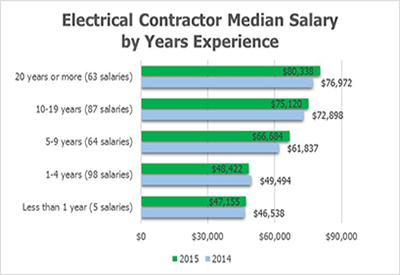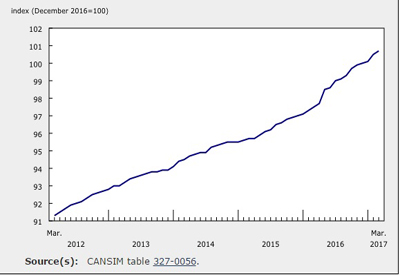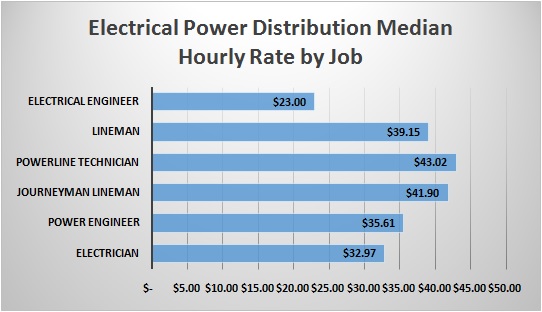Electrical Contractors’ Salaries by Years of Experience



These are not strategic lottery numbers, street addresses or some sort of “find the next number in the series” internet math question. They will mean nothing to you, although I hope that changes as you read these next paragraphs.

January 29, 2023 By Line Goyette Under the Canadian Environmental Protection Act, 1999, the Canadian government is proposing the Regulations amending the products containing mercury. Consultation is open until March 9, 2023. The Products Containing Mercury Regulations (the Regulations), which were published on November 19, 2014, and came into force on November 8, 2015, prohibit the manufacture and import of products containing mercury…

Ever experience the awkwardness of having to call a customer to remind them to pay their bill? You walk a fine line of diplomacy. Being a pushover won’t get the customer’s attention.

The New Housing Price Index (NHPI) rose 0.2% in March compared with the previous month.

July 4, 2023 Fluke Corporation has identified a safety issue affecting FLUKE-17XX, Flat Cable, Voltage Test Lead 3-phase+N cables produced from April 2021 up to and including November 2021 (the Recalled Cables). The Recalled Cables are sold separately as 3PHVL-17XX Cable Replacement Kits and are included with the following kits: As a consequence, Fluke has…

Among six job types, journeyman linemen and powerline technicians are the highest paid power distribution workers in Canada, followed closely by linemen.

December 1, 2025 By Melvin Newman, Patabid CEO & Ian Paterson, Patabid Client Success Manager and journeyman electrician with 30+ years of experience In the competitive world of electrical contracting, knowing how to estimate electrical jobs effectively can make the difference between winning profitable projects and watching opportunities slip away. For electrical contractors, mastering advanced… Read More…

December 1, 2025 Not all USB Chargers are Created Equal As the number of devices used daily increases, so does the need for a charger that delivers safe speeds and maximum charging potential. A high-quality USB charger delivers efficient charging without risk of damage, but the sea of USB chargers and outlets available on online… Read More…
December 1, 2025 A new study from Concordia University’s John Molson School of Business finds that improving housing affordability isn’t just a social good — it’s an economic growth opportunity. Build and Benefit: How Homebuilding Incentives Can Pay Off for Cities, Homeowners and Local Economies reframes housing policy reform as a sustainable fiscal growth strategy, demonstrating meaningful… Read More…

November 30, 2025 By CSC LED In Canada’s industrial lighting sector, one of the most critical yet often overlooked safety components is lighting designed specifically for hazardous locations, otherwise known as HazLoc (hazardous location) LED lighting. For workplaces dealing with flammable gases, vapours, combustible dust, or ignitable fibres, standard LED fixtures simply don’t cut it…. Read More…

December 1, 2025 Skills Ontario is expanding its fleet of Trades & Tech mobile unit thanks to support from the Ontario Government. The government announced this morning it’s investment in Skills Ontario to expand experiential opportunities for Ontario’s future workforce. “Ontario’s future relies on a strong, skilled workforce,” said David Piccini, Minister of Labour, Immigration,… Read More…

December 1, 2025 A new agreement signed by all provinces, territories, and the federal government will break down interprovincial trade barriers, making it easier for B.C. businesses to sell products across Canada, and for people to buy Canadian-made goods. “When threats to Canada’s economic security land at our doorstep, we’re at our best when we work together as… Read More…

December 1, 2025 EB Horsman Cares is the company’s community engagement program that supports local children’s hospitals, communities, and non-profit initiatives with donations, fundraising, volunteering, and scholarships. Since 1993, BC Children’s Hospital has been the primary recipient of EB Horsman & Son’s fundraising. However, as EB Horsman has continued to expand its businesses across Western… Read More…

December 1, 2025 Central to that work, the Government of Canada is stepping up with the recently launched Build Canada Homes, new federal agency with a mandate to scale up the supply of affordable housing across Canada. Build Canada Homes will also help fight homelessness by building transitional and supportive housing – working with provinces,… Read More…
This project is funded [in part] by the Government of Canada.
Ce projet est financé [en partie] par le gouvernement du Canada.
